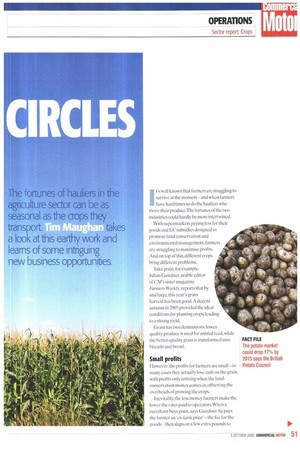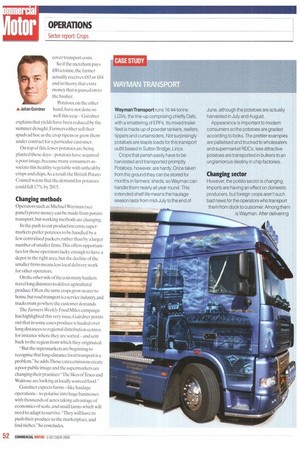t's well known that farmers are struggling to survive at
Page 51

Page 52

If you've noticed an error in this article please click here to report it so we can fix it.
the moment— and when farmers have hard times so do the hauliers who movc their produce.The fortunes of the two industries could hardly be more intertwined.
With supermarkets paying less for their goods and EC subsidies designed to promote land conservation and environmental management, farmers are struggling to maximise profits. And on top of this,different crops bring different problems.
'lake grain,for example.
Julian G airdner. arable editor of CM's sister magazine Farmers Weekly, reports that by and large, this year's grain harvest has been good. A decent autumn in 2005 provided the ideal conditions for planting crops, leading to a strong yield.
Grain has two destinations: lowerquality produce is used for animal feed, while the better-quality grain is transformed into biscuits and bread.
Small profits I lowe r. the profits for farmers are small — in many cases they actually lose cash on the grain, with profits only arriving when the landconservation money comes in, offsetting the overheads of growing the crops.
Inevitably, the less money farmers make the lower the rates paid to operators. When a merchant buys grain,says Gairdner, he pays the farmer an 'ex-farm price' —the fee for the goods — then slaps on a few extra pounds to cover transport costs.
So if the merchant pays £80a tonne, the farmer actually receives £83 or £84 and in theory that extra money that is passed on to the haulier.
Potatoes, on the other A Julian Gairtiner hand, have not done so well this year -Gairdner explains that yields have been reduced by the summer drought. Farmers either sell their spuds ad hoc as the crop ripens or grow them under contract for a particular customer.
On top of this, fewer potatoes are being planted these days potatoes have acquired a poor image, because many consumers associate this healthy vegetable with unhealthy crisps and chips. As a result the British Potato Council warns that the demand for potatoes could fall 17% by 2015.
Changing methods
Operators such as Michael Wayman (see panel) prove money can be made from potato transport, but working methods are changing.
In the push to cut production costs, supermarkets prefer potatoes to be handled by a few centralised packers, rather than by a larger number of smaller firms.This offers opportunities for those operators lucky enough to have a depot in the right area, but the decline of the smaller firms means less local delivery work for other operators.
On the other side of the coin many hauliers travel long distances to deliver agricultural produce. Often, the same crops grow nearer to home, but road transport is a service industry, and trucks must go where the customer demands.
The Farmers Weekly Food Miles campaign has highlighted this very issue. Gairdner points out that in some cases produce is hauled over long distances to regional distribution centres for instance where they are sorted -and sent back to the region from which they originated.
-But the supermarkets are beginning to recognise that long-distance food transport is a problem," he adds.Those extra emissions create a poor public image and the supermarkets are changing their practices:"The likes ofTesco and Waitrosc are looking at locally sourced food.
G airdner expects farms -like haulage operations to polarise into huge businesses with thousands of acres taking advantage of economies of scale, and small farms which will need to adapt to survive.-They will have to push their produce to the marketplace, and find niches," he concludes.
























































































































































































